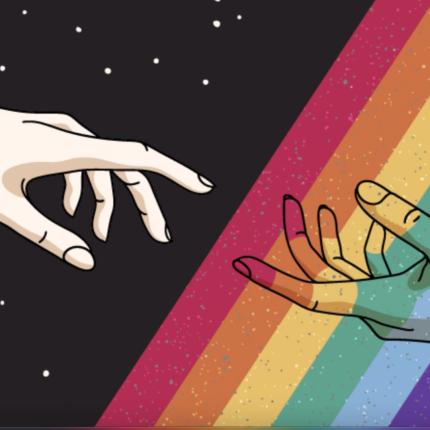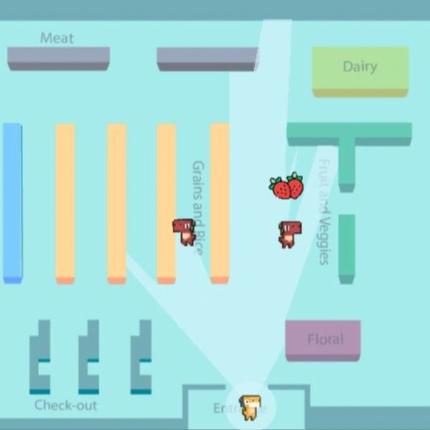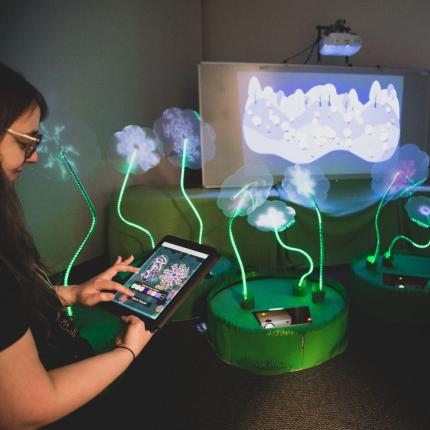"By nature, humans are storytellers," says Lee Hibbard, a Marion L. Brittain Postdoctoral Fellow in the School of Literature, Media, and Communication. "And since people have been people, we have found ways to entertain ourselves."
Hibbard studies how people talk about their identities and share them with others. Much of this comes down to storytelling, he explains. Humans love to share stories because it's how we relate to each other and find common ground. In video games, role-playing, and tabletop games such as Dungeons & Dragons (D&D), storytelling comes to life in an interactive way that movies, TV shows, and books just don't match.
"Games are such a huge marker of identity formation, especially for young people, because they give you the chance to pick up and play with things and try stuff out for fun," Hibbard says. "It's a lower stakes opportunity to experiment with yourself and with other people, and it's a cool way to learn about yourself."
Interest in these kinds of games has exploded since the Covid-19 pandemic, with one study reporting that online searches for D&D have increased by 85% since 2020. Beyond playing the games themselves, fans spend millions of hours a year on Twitch and YouTube watching players adventure in these fantasy worlds. Rising interest and a growing gamer base spur discussion about the importance of inclusion in such spaces, Hibbard says.
In the following Q&A, Hibbard discusses why inclusive gaming is so important and how it can help people in marginalized communities claim space in the real world.
Why is inclusive gaming and storytelling important?
We like to play as people, and that's why it's so important that play remains inclusive — because it's relevant to everybody. It doesn't matter who you are, where you're from, or how you identify; everybody plays in some way, and everybody tells stories in some way.
But the main reason inclusivity is so important is not because everybody plays but because not everybody gets the chance to do so. This can be because of the way games have been marketed and presented or because people don't always have the access that they need to those games.
Who does — and doesn’t — have access to gaming?
There have always been a lot of issues, especially in online and digital gaming communities, where a specific narrow margin of player ousts every other kind of player. There's a lot of rampant sexism, racism, and homophobia.
Focusing on calling attention to those things and trying to create spaces with a zero-tolerance policy for those sorts of things is important. There's a lot of movement in gaming communities towards that, but there's still a long way to go.
A lot of the time, it just becomes a weird separate situation, where you've got the original gaming communities in one place, and then every one of marginalized identities shunting themselves off into their own space. That’s good because it's safe. But it also means that you will often see conversations where you've got games, but then you have ‘girl games’ or ‘Black games’ or ‘queer games’ instead of trying to bring everything together. And I think a lot of that is just because it's challenging to maintain that space when you're being harassed away from it.
How are inclusive movements changing role-playing and tabletop games?
The interesting thing about Dungeons and Dragons and other tabletop-based role-playing games is that many of their roots come from a very specific idea of fantasy stories.
If you look at some of the original D&D storytelling, it has a particular way of handling divisions of good and evil and portraying certain kinds of races and species in negative lights. Those initial creations have continued to be a major conversation point as more marginalized people have come into these gaming spaces and said, 'Hey, the way that orcs are portrayed in classic D&D is extremely racist, and we should stop portraying them that way.' And then other people will say, 'Well, it's always been like this, and you are the one who is reading too much into that, so we're not going to change anything.'
The leading company that makes D&D has yet to really listen, so there has been a lot of push for innovation in the social spaces where people are playing tabletop games. There has been a push for moving into more indie tabletop role-playing games or people making their own games or modules. So even if they're still using the system, they're no longer using the stories or the lore, which is what I've done for the longest time.
For me, it's always been about making up your own story. But the problem is, not everybody is like me. Not everybody has the time or the energy to sit down and create an entire universe that adheres to these principles, which is where that indie tabletop role-playing community comes in. They create modules that are inclusive, and they actively work with content creators of those marginalized identities so that they can bring something to life that isn't just tokenizing or pandering. They're really finding those stories and bringing them forward.
While there are still a lot of issues and arguments about how best to go about that, I've seen so much progress and change in that community in the last ten years and a lot of growth in how people are choosing to spend their money and engage with that kind of content.
How does inclusive gaming help people navigate and claim space in the real world?
In many ways, it's very much tied to the reason we engage with stories and fiction. Sometimes, we spend so much time living in our heads that we don't realize that we have shared experiences or that we don't have the language to define who we are. Play, fantasy, and fiction give us more access and tools to discover those things and a safe place to play around as those characters. One of the reasons it's so effective is because games are so much more interactive and embodied than just watching a TV show or movie.
Gaming is like stepping into the shoes of somebody, and with the option to do so in so many different ways and characters, it's a great way to engage in self-discovery. It's a great way to engage in empathy. And it's an interesting way to interrogate complex cultural experiences without necessarily having to live through those experiences in a lot of ways. In gaming, we can take any situation and turn it 90 degrees and ask, 'What if it looks like this? What would that mean, and how would that change things?'
Is there an intersection between doing that in a game and doing it in the real world, where things are often made or marketed in ways that are exclusive to certain communities?
It definitely makes a difference.
I think some of it is escapism — it's very nice for me to play a game in a world where I'm not constantly afraid for my life. But it's funny because a lot of the themes that I interrogate in the games I run still deal with that sort of thing because it's not that I want to escape the entire existence of the struggles of being queer and disabled and trans in the real world. Instead, I want to entertain the notion that those struggles can be overcome and that acceptance and unity and happiness are possible.
It's difficult to do that in the real world, but I still try to do it as much as I can. So it's very cathartic to create a little miniature fantasy universe where the people in that universe are dealing with a lot of the same issues that I am, but they have more tools to overcome them. They have a community that they can rely on and trust.
Even though there's a lot that I can't do in the world, the very inspiration and thought of it helps motivate me. The more I think about how my characters would engage in mutual aid to help each other, the more I find myself looking around the Georgia Tech campus asking, 'What initiatives are helping food insecure students in the Tech community? What is being done to see useful legislation pass in the local political sphere? How are our students, and how am I, engaging with members of my community in the real world?'
It's not a perfect one for one, but it also doesn't have to be. One gives me hope, and the other gives me something to direct myself towards — an action.








